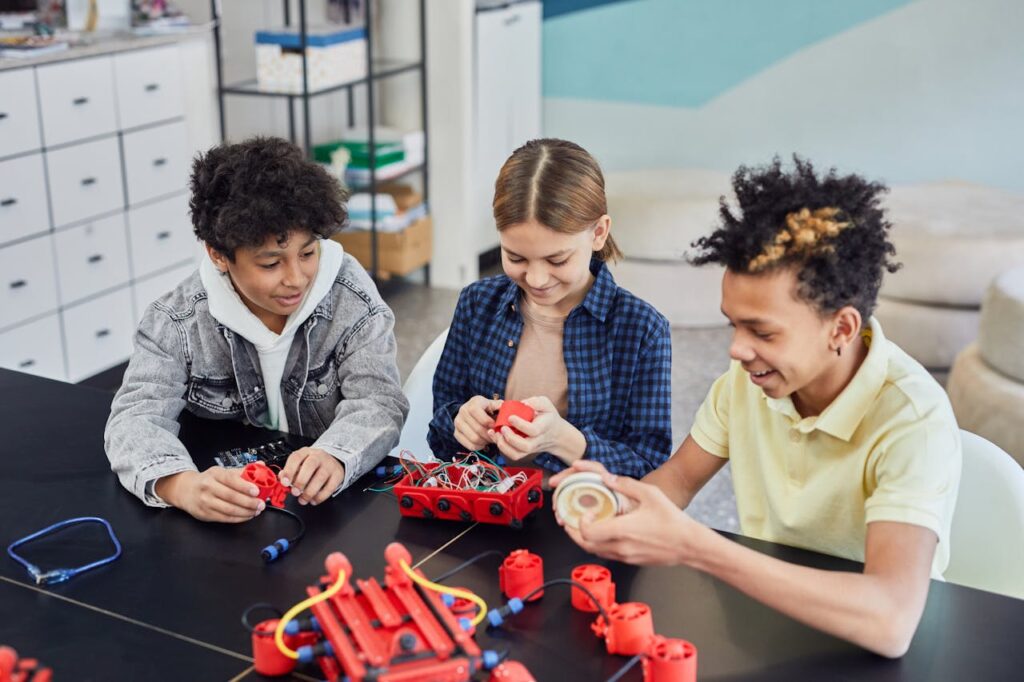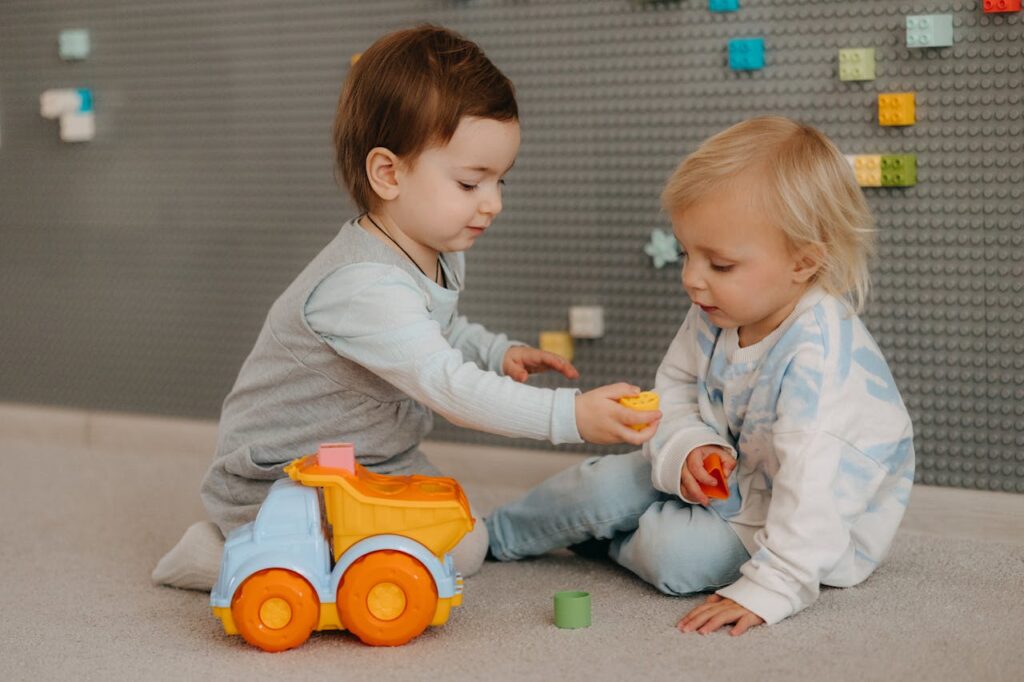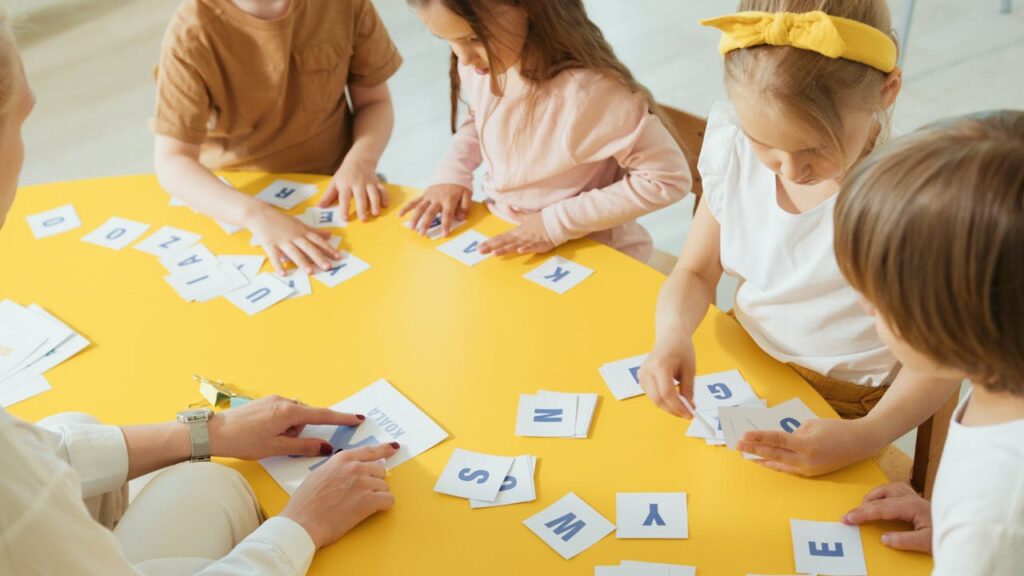Table of Contents
Introduction

Development in children is dynamic and complex, marked by some predictable and very significant developmental milestones. These milestones provide valuable guidelines to parents and teachers for observing a child’s development. A thorough understanding of these developmental milestones, particularly in early childhood education, helps identify any developmental delays and allows for timely intervention.
This detailed manual will outline the most critical components of child development, the stages in cognitive development, the importance of developmental milestones, and ways to support a child’s growth effectively.
Introduction to Child Development
Child development is the progressive sequence of physical, cognitive, emotional, and social changes that take place from birth into early adulthood. Multidimensional in nature, the process envelops how children learn, grow, and acquire the basic functioning skills for survival.
Although the rate may vary from child to child, most children tend to follow a predictable pattern of development and pass through similar stages in the process. This is where developmental milestones come in; they are kinds of checkpoints for parents, caregivers, and teachers that help chart progress so that at a given time, a child should have achieved a certain milestone.
Importance of Developmental Milestones
Developmental milestones are important markers in the child development process. Developmental milestones consist of different behaviors, physical skills, and cognitive skills most children achieve by a certain age.
Developmental milestones help parents and professionals understand how well a child is developing compared to the norm and help in identifying signs of developmental delays at an earlier time.
The developmental milestones monitoring can enable:
Early Detection of Delays: Developmental delays detected early are treatable through timely intervention.
Inform and support customized learning and development: If the caregiver knows what stage of development a child is currently in, challenges and guidance can be tailored appropriately.
Peace of mind: Reaching milestones informs parents and caregivers that a child is developing at an expected rate.
Stages of Cognitive Development
One of the important elements in the development of the child is cognitive development. Cognitive development is one aspect in which thinking by a child, exploring, and determining things is involved. It includes the mental activities of learning, reasoning, problem-solving, and memory.

Swiss psychologist Jean Piaget has come up with a theory on cognitive development which explains this development in terms of four stages, notably:
1. Sensorimotor Stage (Birth to 2 years)
The infant discovers the world during this stage through senses and motor activities. They learn by touching, tasting, seeing, and hearing. In time, they attain object permanence, meaning that things exist even when out of sight.
2. Preoperational Stage (2 to 7 years)
The children in the preoperational stage also start to develop their memory and imagination. They start using symbols and pretend play. However, they are still egocentric, meaning they can’t see any viewpoint but their own.
3. Concrete Operational Stage: from 7 to 11 years
During this stage, children commence reasoning logically about concrete events. Children acquire the notion of conservation-that is, quantity is unaffected by a change in shape. They can also classify things into categories and hierarchies. However, abstract or hypothetical ideas may be difficult to grasp for them.
4. Formal Operational Stage (12 years and up)
During the final stage, adolescents develop the reasoning and thinking of abstract concepts and a logical testing of hypotheses. They solve problems more adeptly and can ponder over moral, philosophical, ethical, and political ideas.
Role of Early Childhood Education in Development
Early childhood education plays a range of vital roles in healthy development. ECE addresses the needs of children from birth to eight years of age when critical events take place in cognitive, emotional, social, and physical development. Quality early childhood programs provide opportunities for an interactive environment that further enhance the child’s innate curiosity and foster cognitive and socio-emotional development.
Key Benefits of Early Childhood Education:
Enhances Brain Development: Early years of exposure to planned learning environments create later years of academic success for a child.
Social Skills: Group settings teach children the ways of cooperation, sharing, and communication.
Emotional Regulation: A child will learn to handle their emotions, develop empathy, build positive relationships.
Physical Health: Planned play and physical activities help in enhancing gross and fine motor development in children.
Growth Developmental Landmarks from Infancy to Adolescence
Breaking this down requires observing the key developmental milestones that one would expect from infancy through to adolescence.

1. Infancy (0-12 months)
Physical Development: The infant grows very rapidly during their first year, during which they begin to develop their motor skills by lifting the head, rolling over, sitting up, crawling, and, in some cases, walking.
Cognitive Development: Infants study their surroundings and memorize familiar faces; they learn to understand cause and effect, such as the shaking of a toy can produce a noise.
Social-Emotional Development: Infants attach to caretakers and communicate their needs by crying, laughing, and moving their body.
2. Toddlerhood (1-3 years)
Physical Development: The children master their movements; they learn walking, running, and climbing. Prehensile skills-things that require grasping small objects-improve, such as with stacking blocks.
Cognitive Development: Children at this stage begin to engage in symbolic play, can follow simple directions, and begin to solve problems.
Social-Emotional Development: Toddlers begin to assert their independence, stating frequently with emphasis the word “no.” Children become attached to other children as well; however, the concept of sharing is still very challenging at this stage.
3. Preschool Age (3-5 years)
Physical Development: Preschoolers refine motor skills through drawing, cutting with scissors, and riding tricycles.
Cognitive Development: Language continues to enhance during these years. Children can elaborate on stories, ask questions, and understand time concepts such as yesterday, today, and tomorrow.
Social-Emotional Development: Preschoolers learn to play cooperatively, express their emotions, and show empathy toward others. Friendships start to become important in their lives.
4. School Age
Physical Development: Coordination has improved to the point where more complicated physical activities are possible now, such as sports. Fine motor skills continue to refine to produce work that is more accurate, such as in writing and drawing.
Cognitive Development: “Children think in a more logical and organized way about concrete events, understand abstract ideas such as time and space, and compare and contrast ideas”, hence building strategies to solve problems.
Social-Emotional Development: Peer relationships become central to children’s lives. Children seek independence from their families and begin to form an identity.
5. Adolescence (13-18 years)
Physical Development: The hallmark of adolescence is puberty, characterized by rapid physical growth and sexual maturation.
Cognitive Development: Abstract thinking, logic reasoning, and multiple perspectives are developed in teens. Teenagers tend to question authority and strive to gain as much independence as possible.
Social-Emotional Development: Throughout adolescence, several challenges arise regarding identity and peer pressure. The relationship becomes increasingly complex with time, and the teenager might experience mood swings and become more sensitive than before. Delays in Development
Not all children achieve these important developmental milestones at the same time. Developmental delays identify children who do not reach expected milestones in one or more areas of development, which include physical, cognitive, communication, and social-emotional development.
Signs of Developmental Delays:
Physical Delays: Late sitting, walking, coordination
Cognitive Delays: Child has problems learning new skills and/or processing information
Speech and Language Delays: Trouble talking, understanding, and following directions.
Social-Emotional Delays: An inability to get along with others, show control of feelings, or get along with others.
What Causes Developmental Delays?
Developmental delays are caused by several factors, which include:
Genetic Problems: A genetic disorder such as Down syndrome and many others could be responsible for delays in development.
Premature Birth: Infants who are born prematurely may be delayed in their development due to a particular premature organ or body system.
Environmental Neglect and Abuse: A child suffering from neglect, abuse, malnutrition, or being exposed to toxic substances like lead might experience delays in development.
Other causes of developmental delays include medical conditions such as hearing and vision problems, autism, and chronic diseases.
How to Address Developmental Delays
If you feel your child may have a developmental delay early action is required. Pediatrics support, early childhood educators, and therapists can assist through the provision of services which may be needed for the specific needs of the child.
What to Do:
See a Pediatrician: If you are concerned about a child’s development, the child’s pediatrician will conduct developmental screenings, which may lead to referrals to a specialist.
Get an Evaluation: Speech, occupational, or physical therapy evaluations can spot specific areas of concern
Early Intervention Programs: Through age three, most communities have early intervention programs which can help your child catch up in the things that they may be slow to develop.
Monitor Progress: Keep a record of your child’s developmental progress and communicate regularly with professionals.
Supporting Child Development at Home
Parents and caregivers can play a vital role in fostering development during this period. These strategies focus on ways to promote healthy development.
Play: This is a play-oriented period in development. Parents provide a variety of toys and activities that encourage motor, perceptual, and social skills.
Language Development: Language continues to develop quickly and parents should continue talking to their child, reading books and engaging in conversations that will build these skills.
Safety: Provide your child with a safe area to explore, learn, and play in.
Healthy Habits: Normal sleep schedules, proper nutrition, and regular exercise go a long way in all round development of the child.
Emotional Attention: Facilitate emotional development of your child through a secure attachment relationship, response to his needs and teaching him how to manage his feelings.
How Professionals Monitor Development
While parents and caregivers are of most importance in supporting their children’s development, professionals such as pediatricians, early childhood educators, and developmental psychologists also provide a very important expertise. For instance, these professionals are trained to perform assessments and screenings that determine whether a child is meeting developmental milestones or whether he or she is at risk for a problem that may require intervention.

1. Pediatricians
Well-child visits to a pediatrician are scheduled regularly. Through such visits, pediatricians monitor the child’s physical growth and mental development social behaviors of a child. They also offer developmental screenings that examine the motor, speech, and emotional abilities of a child. The next step is referrals to specialists or early intervention programs when needed.
2. Early Childhood Educators
Early childhood education teachers and caregivers spend a great deal of time with the young child, observing daily behaviors and peer interactions throughout this period of growth. Early childhood teachers and caregivers are also the first potential notifiers of developmental delays within a child’s cognition, emotional intelligence, or physical development.
In addition, a structured early childhood education curriculum helps the child build the skills they will need for later academic success as well as emotional well-being.
3. Developmental Psychologists and Therapists
Developmental psychologists study the developmental changes in childhood that distinguish one stage of childhood from another. When a child is not developing typically, developmental psychologists can diagnose problems and develop appropriate interventions. Other therapists including speech-language pathologists, occupational therapists, and physical therapists are ready to intervene to help children overcome many kinds of developmental difficulties.
Common Developmental Challenges and How to Address Them
It is noted that children can have problems in one or more areas of development, but most children can overcome them all with appropriate strategies. Below are some common developmental challenges and approaches to addressing them.
1. Speech and Language Delays
Some children can have speech and language delays concerning problems in articulation of words, following instructions, and understanding a conversation. Delays in speech and language development may lead to frustration and impacts a child’s interaction with others.
Approaches:
Speech Therapy: Through appropriate language skills, a child may see a speech-language pathologist with the use of play-based and structured activities.
Encouraging Talk at Home: Parents can do this by reading to the child, engaging the child in conversations, and asking open-ended questions that will in turn encourage the child to use language.
2. Motor Skill Delays
Motor skills include fine and gross movements. A child may show delay in acquiring coordination, balance, or muscle tone that will influence walking, running, and manipulating of smaller objects.
Approaches:
Occupational and Physical Therapy: Occupational and physical therapy helps in developing motor skills, emphasizes building muscles and the ability to coordinate.
Physical Play: Encouraging them to play physically, such as climbing, jumping, or playing with building blocks, would help develop their motor skills and abilities.
3. Emotional and Social Developmental Challenges
Some children have difficulty controlling emotions or embracing other social gestures. Given the challenges identified, it may influence the developed relationship with their peers and caregivers.
Approaches:
Social skills training involves instruction regarding social cues and social situations through the aid of a therapist or counselor. In this respect, emotional coaching-whereby parents identify a child’s feeling and discuss how to handle it in a socially acceptable manner-is helpful to children.
4. Cognitive delays
Cognitive delays could include how a child learns, problem-solving, or processing information. Each delay might be evident in following directions, sustaining attention, or cause and effect.
Approaches:
Cognitive Therapy: Trained specialists work with the child on site-specific cognitive skills such as memory, problem-solving, and attention.
Structured Learning Activities: Games, puzzles, and activities that may be challenging could be used to engage children and improve cognitive development.
The Importance of Patience and Understanding

While one should know the developmental milestones, it is equally important to remember that each child develops at his or her own pace. Some children might be very brilliant in certain things while they would need extra support in other areas. The key is to provide a nurturing environment in which they feel supported, encouraged, and loved.
Patience is one of the most vital and required aspects of parenting or child caregiving. Anxiety and stress are transferred to children, who then face significant difficulties in learning and development.
A positive approach towards a child’s development, very serene and cool, would contribute to building their self-confidence and attitude towards further learning. Another way to encourage motivation and self-esteem in children is to let them know that small accomplishments, even small ones, are valued.
Whether your child is advanced, doing just fine meeting milestones, or dealing with some delays in development, here are a few ways to support them in their development at home:
1. Nurture Curiosity and Exploration
Encourage your child to explore his environment, ask questions, and try new things. Open-ended play, such as building with blocks, painting, or playing with sand, allows children to employ their imagination and begin problem-solving.
2. Language Development Through Reading
One of the best ways to support cognitive and language development in a child is reading. Reading to the child from an early stage, the books selected must be appropriate for their age and will help stimulate interaction. Discussion of the stories, identification, and explanation of pictures, even questions about the actual action in the book, further build up the development of language and comprehension.
3. Encouraging Social Behavior Through Play and Interaction
Social behavior is gained by socializing. Let your child spend time playing with other children, or join playgroups and team activities to make them understand the dynamics of the relationship. This they learn by sharing, taking turns, and being able to communicate with others.
4. Establish a Routine
A predictable routine provides children with a sense of security and helps them understand what comes next. Establish regular times for meals, naps, active play, and bedtime. It decreases anxiety because one now can anticipate a typical routine and there is, therefore, better behavior since it is easier to segue into different activities.
5. Encourage Physical Play
It is with the help of active physical activities that development of the motor system is possible. Let your child run, jump, climb, and play outside. Riding a tricycle, kicking a ball, or playing in a jungle gym will help your child in general development of balance, coordination, and strength.
6. Be a Positive Role Model
They learn from what they see from adults around them. Model good behaviors: communication, problem-solving, and empathy. If you model patience, kindness, and resilience, your child will likely adopt those qualities too.
Conclusion
Understanding the stages of child development allows parents and caregivers to help a child through those critical periods of his or her development. Although children are different, tracking these milestones helps identify any developmental delays in a child and seeks early intervention if needed.
The support given through early childhood education, playing, and nurturing can assist the children in achieving their potentials.
It isn’t always linear in development, and sometimes struggles may lie in between. At the same time, with proper support, guidance, and empathy, each child will be enabled to grow, thrive, and succeed. The key lies in understanding the journey of each child, encouragement, and cultivating his or her love for learning and exploration.

